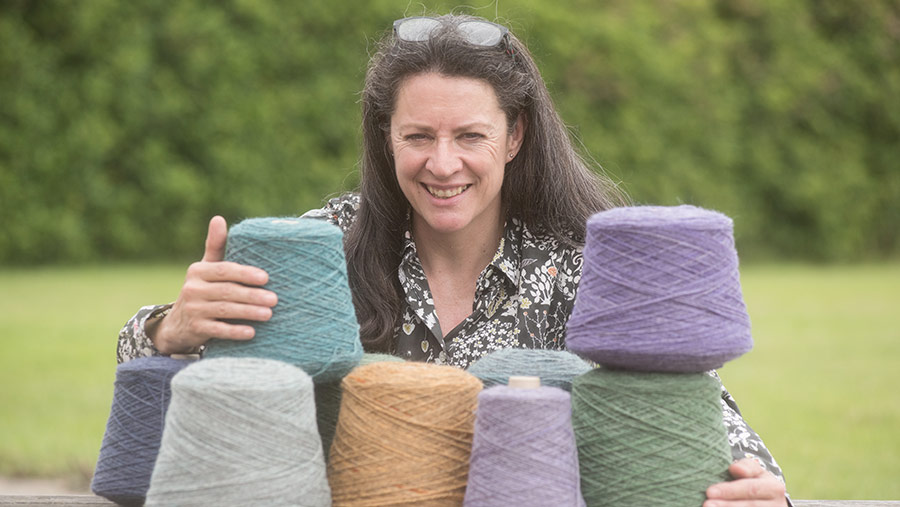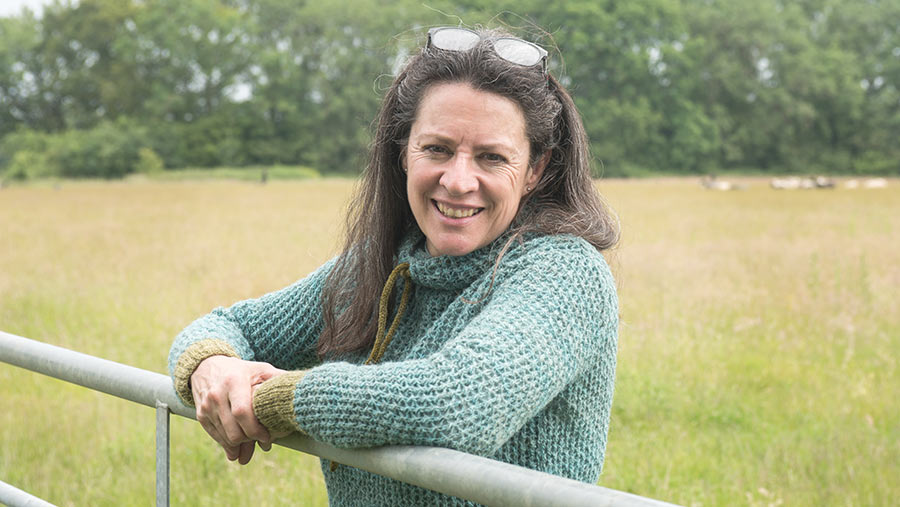Farmers Weekly Awards 2019: Diversification Farmer of the Year
 Emma Boyles © Hugh Nutt
Emma Boyles © Hugh Nutt Emma Boyles is the 2019 Farmers Weekly Diversification Farmer of the Year.
Emma and her team have not looked back since diversifying into wool production at Well Manor Farm, on the Hampshire-Surrey border.
Years of intensive arable farming had affected the flora and fauna native to the land. But soon after buying the farm in 2004, Emma started to look at the wool industry and her passion for sustainable farming as an alternative income stream.
See also: Meet the 2019 Diversification Farmer of the Year finalists

Emma Boyles © Hugh Nutt
Emma Boyles
The Little Grey Sheep, Hook, Hampshire
Farm facts
- 125ha farm (28ha woodland and 16ha pasture)
- 600-head flock of Gotland, Shetland and Merino sheep
- 12ha of wheat and 18ha of legume-rich fallow, contract farmed
- 50% growth in wool sales in 2017-18
- Higher Tier Countryside Stewardship
Textiles addiction
Mother-of three Emma developed her addiction for textiles as a little girl growing up in a dairy farming community in south Pembrokeshire.
“Everyone sniggers about knitting. They think ‘old ladies’. But it’s a $2.79bn industry in the US,” she says. “In the UK, the resurgence in handcraft over the plast 10 years has been huge and it continues to grow.”
Emma’s mission was to produce the softest, most lustrous British knitting yarn. She set out to breed her own specialist flock under the guidance of shepherdess Susie Parish – her right-hand woman and award-winning shearer, whose dedication to the production of fine fibre and care of the flock is unrivalled.
Susie is also heavily involved in the British Wool Marketing Board and is their only female shearing instructor to date.
Their business started small with Gotland sheep – a rare breed in the UK – offering highly sought-after sheep skins, lean meat and lustrous fleeces.
Selective breeding
Since then, they have developed into selectively breeding the Gotlands with Shetlands, and importing Merino rams from Marseille to produce superfine 19-micron fleeces.
They produce a range of yarn from their Gotland and British Stein Fine Wool (which is trademarked) flocks. The premium four-ply yarn – the finest-lustre fibre in the UK – is the result of eight years of selective breeding. Hampshire yarn, a more traditional, commercial grey yarn – which is combined with wool collected from other farms in the county – is also produced.
They have expanded the flock to 600 sheep and lamb between 80-120 animals each year. Susie shears the sheep around Christmas, as all the oils are still contained in it, before the sheep are tucked up in the barn over winter.
Customers worldwide
Every fleece is hand-sorted on the farm to ensure only the best-quality fibres go into their yarn. The fibre is then washed in Yorkshire and spun in Britain before heading back to the farm to be hand-dyed by Emma, who is inspired by the colours of the countryside.
The first production of fibre in 2010 was just 25kg. But as they approach their 10th anniversary, the next shipment of fibre will be 4,000kg. Orders are shipped around the world to countries including China, Japan, Canada and the US.
In March, Emma launched Sticka the Tithe Collection, their first proper knitting pattern book. But it’s not just a pattern book – it also informs customers about the farm’s practices and heritage.
Emma and her team have taken an intensive arable farm that was returning a marginal profit, and built a sustainable diversification that has transformed the fortunes of the farm business.
They have done this by using the land they have available, changing their farming direction and continually innovating to become a market leader.
Winning ways
- Great innovation
- Excellent marketing of a high-added-value product
- A commercial financial margin of the product
- Environmental sustainability and management
- Inclusive and education business – spreading the word not only of their product, but also their sustainability and environmental management
A word from our independent judge
“Little Grey Sheep demonstrates there is more to sheep production than meat alone. With selective breeding, product development and excellent marketing, the business has shown innovation and determination to drive income and sustainability – not only financial, but also environmental.”
Oliver McEntyre, national agriculture strategy director, Barclays
The 2019 Diversification farmer of the Year category is sponsored by the Camping & Caravanning Club
 The finalists were:
The finalists were:
- Michael and Jenny Churches
Glastonbury Wedding and Events Venue, Godney, Somerset - Matthew Havers
Peck Drinks, Eye, Suffolk
